Jerusalem, a city deeply rooted in faith, culture, and centuries of complex history, was once again rocked by tragedy on September 8, 2025, when a brutal mass shooting at a busy bus station claimed at least six innocent lives and left over 20 others injured.
The attack occurred at Ramot Junction, a public transport hub where ordinary people were simply going about their day—students, workers, families, elderly—all caught in a moment that changed their lives forever.
This heartbreaking incident has sparked global outrage, intensified tensions in the Israeli-Palestinian conflict, and raised serious concerns about security, retaliation, and peace in the region.
Let’s break down what happened, who was affected, how the world is reacting, and what this means for Jerusalem’s already fragile peace.
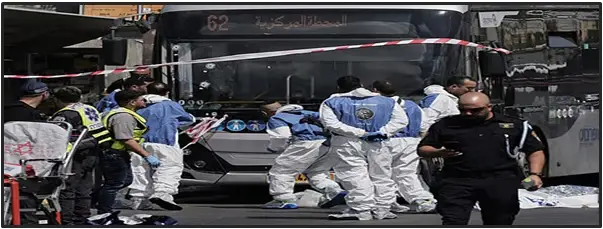
What Happened: The Tragic Incident at Ramot Junction
On the morning of September 8, 2025, two Palestinian gunmen reportedly opened fire at civilians standing near and boarding buses at Ramot Junction in East Jerusalem.
Key Details:
-
Time of attack: Around 8:30 AM local time
-
Casualties: 6 people killed, over 20 seriously injured
-
Attackers: 2 Palestinian men, shot dead by Israeli police on-site
-
Weapons used: Automatic rifles (unconfirmed model)
Witnesses described the scene as chaotic and terrifying. One survivor told reporters:
“I heard the first shots and thought it was construction work. Then people started screaming, and I saw blood. I ran with my child, not knowing if we’d survive.”
Who Were the Victims?
What makes this tragedy even more heartbreaking is the human face behind the headlines. The victims were not soldiers, politicians, or militants. They were ordinary citizens:
-
A young man recently married, waiting to catch a bus to work
-
A doctor, beloved in his community, who also volunteered as a baker for a local food charity
-
A 70-year-old grandmother, heading to visit her grandchildren
-
Two Torah scholars, known for their kindness and devotion
-
A university student, full of dreams, whose life was just beginning
Each life lost represents a world destroyed—a family broken, a community grieving.
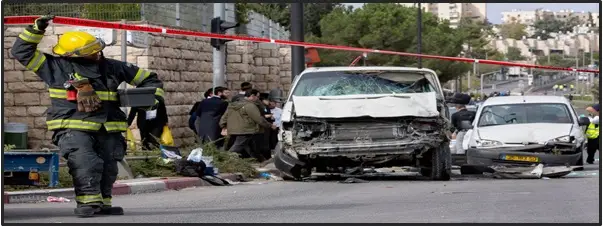
Security Response & Immediate Aftermath
Within minutes of the attack, Israeli security forces arrived on the scene and neutralized both attackers. A wide perimeter was set up, and injured victims were transported to nearby hospitals, some in critical condition.
The Israeli government, led by Prime Minister Benjamin Netanyahu, immediately announced the following actions:
-
Launch of a full investigation into the planning and execution of the attack
-
Increased security presence in and around Jerusalem
-
Announcement of plans to demolish the homes of the attackers in the West Bank
-
Detainment of several relatives and suspected accomplices of the attackers
Controversial Policy: Demolition of Attackers’ Homes
One of the Israeli government’s first publicized responses was to approve the demolition of the attackers’ family homes. This is a long-standing, though highly controversial, policy used by Israel as a deterrent against terrorism.
Supporters say:
-
It sends a strong message that terrorism comes at a heavy price.
-
It discourages future attacks by increasing the stakes for families.
Critics argue:
-
It constitutes collective punishment, which affects innocent family members.
-
It further inflames tensions and leads to retaliation, creating a vicious cycle.
Human rights organizations like Amnesty International and B’Tselem have repeatedly called for an end to this practice, labeling it inhumane and counterproductive.
International Reactions: Condemnation and Caution
The Jerusalem shooting drew strong reactions from around the globe.
United States:
-
The U.S. State Department condemned the attack in the strongest terms, reaffirming Israel’s right to defend itself.
-
It urged both sides to avoid further escalation.
United Nations:
-
The UN Special Envoy to the Middle East said:
“This act of violence is horrific. Civilians must never be targets.”
-
Called for de-escalation and respect for international law.
European Union:
-
Expressed deep concern over rising violence in the region
-
Urged Israel to refrain from collective punishment
The Bigger Picture: Why Tensions Are So High in Jerusalem
The Israeli-Palestinian conflict is deeply entrenched, and East Jerusalem has long been a flashpoint due to its religious significance, political sensitivities, and demographic pressures.
This attack didn’t happen in a vacuum:
-
Recent months have seen increased military raids in the West Bank
-
Palestinian militants have stepped up activity, citing the occupation and daily hardships faced by residents
-
Jewish settler activity in contested neighborhoods has also intensified
The result? A highly combustible environment where a single act of violence can ignite broader unrest.
Humanitarian Impact: Fear, Grief, and a Community in Mourning
The aftermath of the Ramot Junction attack is being felt not just in policies and headlines but in hearts and homes.
Victims’ Families:
-
Are calling for justice, but also pleading for unity and peace
-
One father said, “I lost my son today. Please don’t let others lose theirs tomorrow.”
Jerusalem Residents:
-
Many are scared to use public transport
-
Increased police presence is both reassuring and unnerving
-
Businesses near the attack site remain closed
Palestinian Families:
-
Fear mass arrests, home demolitions, and collective backlash
-
Human rights groups warn of further escalation in the West Bank
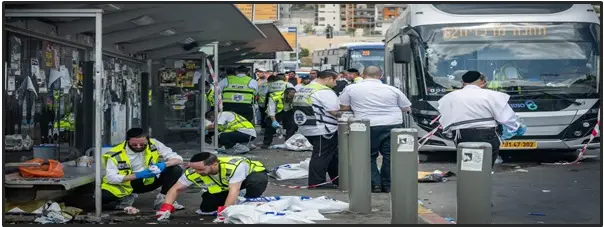
Source : Google
Voices for Peace: Can This Tragedy Lead to Dialogue?
In the midst of the grief and fear, some voices are calling for peace, not vengeance.
Israeli and Palestinian peace activists jointly issued a statement:
“We condemn this horrific attack, but we also condemn the cycle of violence that leads to it. Security without justice is a fragile illusion. We need peace talks, not just arrests.”
Religious leaders from Jewish, Muslim, and Christian communities held a joint prayer session at a synagogue near the site, sending a powerful message that coexistence is possible, even now.
Final Thoughts: A City on Edge, a Region in Pain
Jerusalem is often called the City of Peace, but today it is a city mourning yet another violent tragedy. This attack at Ramot Junction is not just a blow to Israeli civilians—it’s a reminder of how fragile peace remains in the Holy Land.
As the world watches, the people of Jerusalem—Jews, Muslims, and Christians alike—continue to live through one of the most emotionally charged and politically complex conflicts of our time.
We must honor the victims, not just with words, but with actions that break the cycle of hate. Because peace is not built with bullets—it is built with bravery, dialogue, and the belief that every life matters.

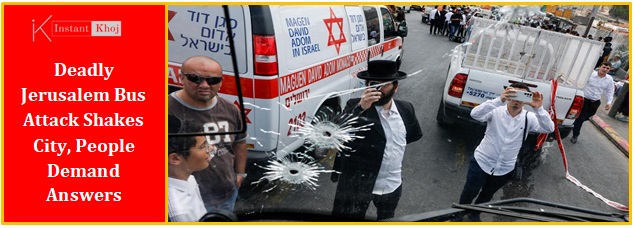

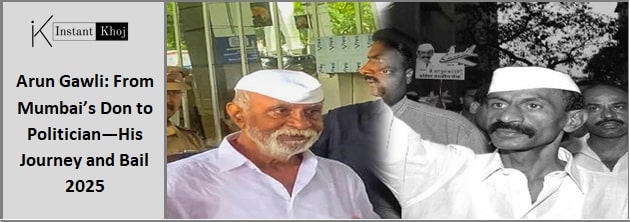
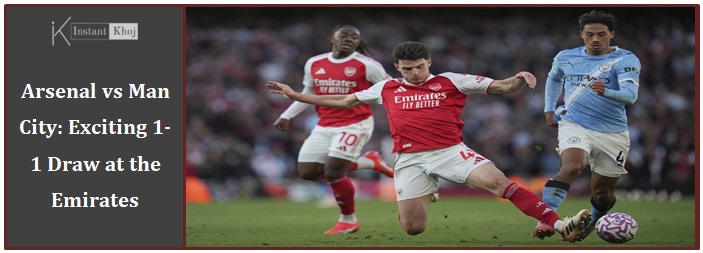
2 thoughts on “Deadly Jerusalem Bus Attack Shakes City, People Demand Answers”